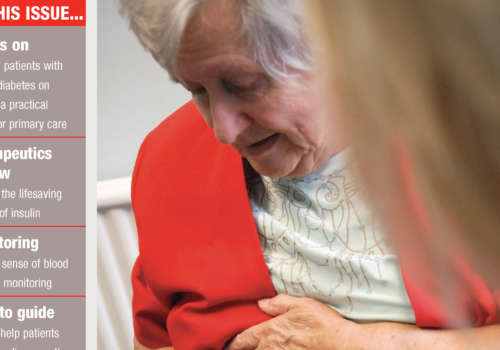Starting on insulin injections represents a major change for most people with diabetes. Many aspects of everyday life will need to be considered more carefully,which can be quite daunting.With adequate support and education from the practice nurse,patients can be encouraged to be proactive and positive towards this new stage in their lives. This article looks at people with type 2 diabetes or those with stable type 1 diabetes,who are likely to be managed in general practice.We discuss everyday concerns about using insulin,why people on insulin are prone to put on weight,how exercise affects blood glucose levels,how to manage illness in those with diabetes and how to adequately prepare for holidays.
Insulin in type 2 diabetes: getting the balancing act right
How much insulin does a patient with type 2 diabetes need for optimal glucose control? It can sometimes be a tricky balancing act to get the dose just right – too much increases the risk of hypoglycaemic episodes and too little risks poor glucose control and the associated long-term complications.In this article we review what the research and guidelines recommend in how to ensure each patient gets the best dose of insulin.
Hitting the spot: injection technique using an insulin pen
This article provides a simple guide to the do’s and don’ts of insulin injection technique, taking you through the steps that patients need to go through to inject their insulin correctly.
Helping patients on insulin to travel safely
People with diabetes need to plan carefully for holidays, especially if they are treated with insulin. Although much of the advice will be the same as for the general population, these patients are more vulnerable and will need to take particular care in looking after themselves to avoid any ill health while away from home.
Optimising insulin treatment in primary care
Everyone with diabetes deserves the highest standards of personalised diabetes care, no matter where, when or by whom this care is delivered.
Working In Partnership With Patients: Developing A Diabetes Pathway With Local Service Users
This article looks at how a group of patients worked in partnership with North Lancashire Teaching Primary Care Trust (PCT) to produce a patient information leaflet for people newly diagnosed with diabetes (see page 32).The leaflet is intended to act as a guide, giving the new diabetic information and facts to help them,as well as encouraging them to find out more for themselves and enabling them to ask the appropriate questions.
Get Your Socks Off: Diabetic Foot Care In The Community
All of us delivering care to people with diabetes know that it’s increasingly common, affecting two million people in the UK,according to figures for 2007.It is also expensive,taking up about 10% of NHS costs and 5% of social costs. We also know it’s the commonest cause of non-traumatic lower limb amputations and that’s just one of the reasons that we spend so much time in clinics optimising care and detecting complications.But how well do we understand the impact of foot disease and how organised are we in assessing and treating it?
Starting On Nateglinide Or Repaglinide
Cardiac Resynchronisation: A New Approach To Managing Chronic Heart Failure
About 40% of patients with heart failure die within one year of diagnosis,underlining the need for more effective management.Nearly one-third of patients with heart failure may have an abnormality in the electrical conducting system of the heart.In this article,we review cardiac resynchronisation and its role in managing chronic heart failure.
Walking your way to good health
What are the health benefits of walking,and how much should we walk and how often? In this article,we review the evidence on the impact of walking on health, the latest recommendations on walking,how to overcome barriers to walking,how to motivate our patients to start walking and how to keep it going.
Aspirin or Warfarin for Atrial Fibrillation
Editorial
A happy and productive 2009 to all our readers! We hope that as we all face the challenges – and, we hope, joys – that this year will bring, BJPCN can provide the practical and reliable information and advice that you tell us you find so useful.






















